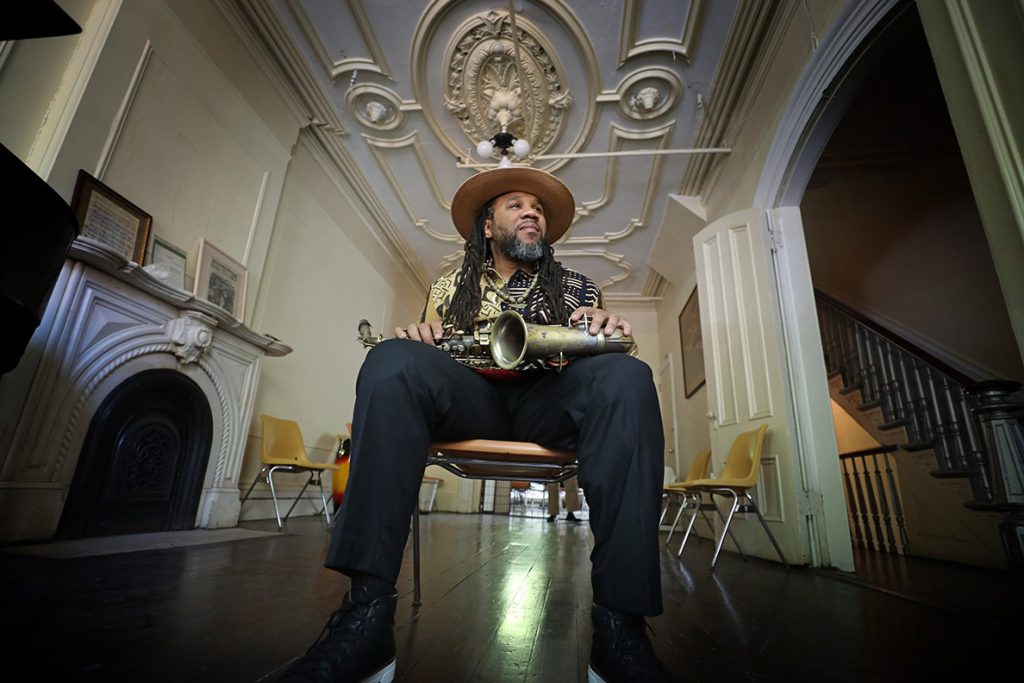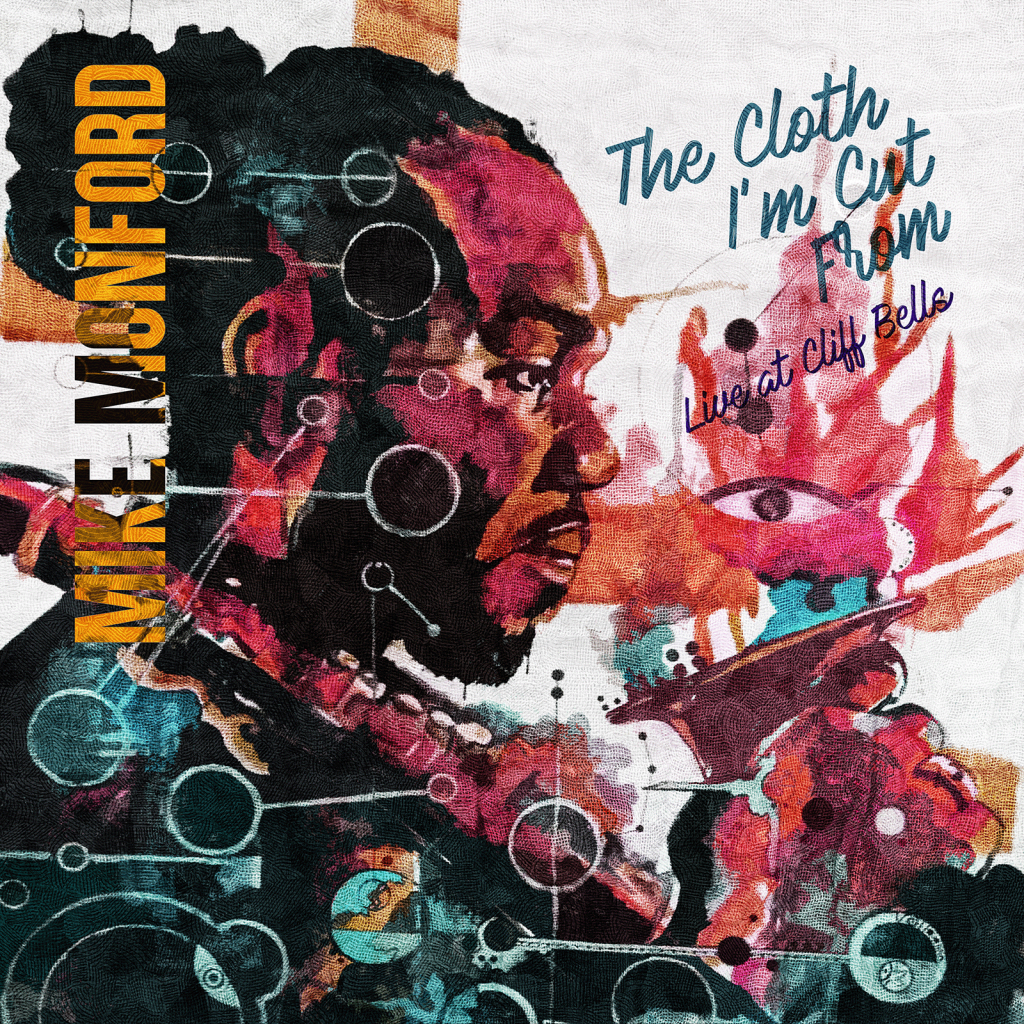Alto Saxophonist Mike Monford to Release New Project “The Cloth I’m Cut From” on May 17th, 2024 | LISTEN!
Mike Monford’s The Cloth I’m Cut From is flowing, relaxed, open music, heavy on rhythm, melody and emotion; a microcosm of Detroit’s diverse scenes
Surrounded by a large multi-generational ensemble — from seasoned vets like Jaribu Shahid and Pamela Wise, to young MC Napi Devi — Monford presents performances from Detroit’s Cliff Bell’s, recorded in Summer 2021
Album out May 17, 2024 on CD, Bandcamp & Streaming Platforms
The musical and spiritual values of people’s lives come in so many different shapes, sizes and narratives, it’s easy to forget that beauty, meaning and “fulfillingness,” to use the word of Detroit’s great son, Stevie Wonder, can take on many forms. A successful result always requires intention, it needs the application of a studied craft, and a community to provide a musicking feedback loop. But how long the journey toward the result is, or the true definition of “successful,” are in the ear of the beholder.
Imagine, for instance, the beautiful ongoing journey of Mike Monford , a Detroit-based alto saxophonist, band-leader, educator and depositor of sonic history. Actually, imagine numerous, naturally overlapping sonic histories. Because Monford’s life’s experience spans a Motor City hip-hop youth alongside his neighbors (and fellow Pershing High School alumni) J Dilla and Amp Fiddler; mentorship by a wide swath of Detroit’s jazz elders, followed by study with the legendary saxophonist Jackie McLean at Hartford’s Hartt School conservatory; partnership with the great pianist Marc Cary, who played on Monford’s 2012 full-length debut, Perseverance; and a decade of key roles in his hometown’s reassertion of its spiritual, free-jazz, Afrofuturist and Autophysiopsychic (to use a word coined by another of Detroit’s great sons, Yusef Lateef – another Monford teacher) musical tradition.
It seems like Mike Monford is forever both teacher and student. And his long-gestating sophomore album, The Cloth I’m Cut From, what he calls a “musical autobiography,” is a statement about where he came from but also where he’s going. Surrounded by a large multi-generational ensemble of Detroit players — seasoned vets like Griot Galaxy/Arkestra bassist Jaribu Shahid and Tribe keyboardist Pamela Wise, as well as student violinists Bebe Sewell and Xavier Gillium, and young MC Napi Devi — Monford unfurls the title’s biographical tapestry in five thrilling extended performances recorded at the legendary Cliff Bell’s club, in the summer of 2021. Between compositions by legendary figures influential in his life (McLean, Lee Morgan, Abbey Lincoln) and Monford originals inspired by his son (“Jah Jah”) and mother (“Piercing Eyes”), it is flowing, knowing, relaxed open music, heavy on rhythm, melody and emotion, equally indebted to hard-bop and soul-jazz turns, spiritual and Afrofuturist jazz yearnings, all propelled by Afro-Latin percussion. One microcosm of Detroit’s musical community.
Detroit isn’t the only beautiful music town in Mondofrd’s DNA. Both his parents — a soul-loving dad and a country-and-western fan mom — were transplants from Philly, where young Mike spent time with North side relatives, soaking in the sounds of Sun Ra’s Arkestra and discovering Albert Ayler. Later in life, after he left Hartt, Monford spent his share of time in New York, Harlem in particular, where his friendship with Cary found him woodshedding and recording Perseverance (with bassist Tarus Mateen, drummer Steve Williams and trumpeter Rayse Biggs). He grew up a hip-hop kid in Detroit’s Conant Gardens neighborhood, began DJing and making beats (as DJ M+M), rolling with kids who became part of Dilla’s Slum Village. Already a music-head, Monford picked up the horn in high school, and began what he deems his “university of the streets,” tutored in a big band run by Hakim Jami (credits on Don Cherry’s Brown Rice and Archie Shepp’s Attica Blues , among many). Monford recalls studying “with all the top jazz masters in town, in their living room, $20/hour lessons,” folks like Wedell Harrison, Marcus Belgrave, Harold McKinney and Ken Cox. When he set his sights on studying at the conservatory, the musical community helped prepare him: “[bassist] Rodney Whittarker wrote my recommendation, [saxophonist] James Carter got me ready for the audition,” Mike says. In Hartford, McLean took Monford under his wing, continuing an education that emphasized both jazz traditionalism and more freedom-oriented playing; and Monford took advantage of his time on the East Coast, both in terms of seeking out more wisdom (traveling to Amherst to take lessons from the great Lateef), and practice it (in big bands helmed by McLean and Bill Lee, film-maker Spike’s dad).
Monford first returned to Detroit in the early Aughts, but soon temporarily put down his horn, a young father trying to provide for his family, working a day job helping folks with traumatic brain injuries, where his experience with music’s healing power was an advantage. Yet he kept returning to the saxophone, playing in his own band, Quintessence, and performing alongside the city’s plethora of great working improvisers — Jami, alto saxophonist Cassius Richmond, drummer Francisco Mora Catlett, and others. After following Cary to New York for another stint (the one that resulted in Perseverance), Monford settled back in Motor City for good, a critically acclaimed, self-released album in his pocket. Though Detroit was then at its lowest ebb in terms of the city’s stature and self-governance, its hallmark cultural and civic pride were never in question.
Monford leaned into these attributes, with a collective (he calls it a movement) named Detroit Effervescence. This was the beginning of the saxophonist’s role as a generational conduit, a teacher and organizer, and a re-organizer of sound, bringing classic avant-garde Black Arts and Afrofuturist leanings into conversation with hip-hop, soul and classic jazz. Effervescence recruited the like of pianist Ian Finkelstein, trumpeters Kris Johnson and Dwight Adams, the MC Mahogany Jones, drummer Tariq Gardner and Djallo Djakate, bassists Jaribu Shahid and Marion Haden, “people,” says Monford, “who wanted to continue to fight, to carry this art-form out into the diaspora despite all the challenges.” Mike Monford & Detroit Effervescence began performing regularly at the Detroit Institute of the Arts, Cliff Bell’s and throughout the D. Its success came with opportunities and a different outlook: Monford also joined the touring band of the great French Afro-soul duo Les Nubians, became music director at the local Chandler Park Academy, and a contributor to the local BLAC Detroit site, where he would cover local music, and find new musicians to engage.
In many ways, The Cloth I’m Cut From continues the social and musical ideas Monford arrived at over the last decade — paying tribute to aspects of his own life, of the musicians and family members around him, but also paying it forward. Though Monford’s alto saxophone is prominent throughout, The Cloth shines when the band embraces this music in the moment, as an ensemble piece — whether that’s the flight of young Bebe Sewell’s violin and Allen Dennard’s trumpet through the air, on the opening “Jah Jah”; or when Shahib’s bass and William Hill’s Rhodes lead the coda of the soft, ballad-like “Piercing Eyes” into a hard-groove drums+horns crescendo. This is when the future and the past, the shared principles and the individual creativity all come together, just as Monford imagined, a story of his own life reflected in the music, shining a light on what’s to come.
In the aftermath of recording The Cloth I’m Cut From, Monford has ventured even further into expansive community work. Over the past three years, he, the shredding guitarist Lu Fuki and Fuki’s partner, Tazeen Ayub, have joined prominent Chicago improviser-teachers Angel Bat Dawid and Dr. Adam Zanolini, to helm the collective called Autophysiopsychic Millennium. It is a mutating group of Chi and Det players using the music, poetry and scholarship of Yusef Lateef as a launch-pad for “taking the shackles off students’ and listeners’ minds.” They brought this music to Carnegie Hall (as part of its 2022 Afrofuturist festival), to clubs around the country, and, last summer, to a residency at the Cranbrook Academy of Art, where in between classes and workshops, they wrote music around Lateef’s book Night in the Garden of Love. It is the most recent example of how Mike Monford’s set of values informs the work, its intention and its beauty. All aligned.
Fully Altered Media

